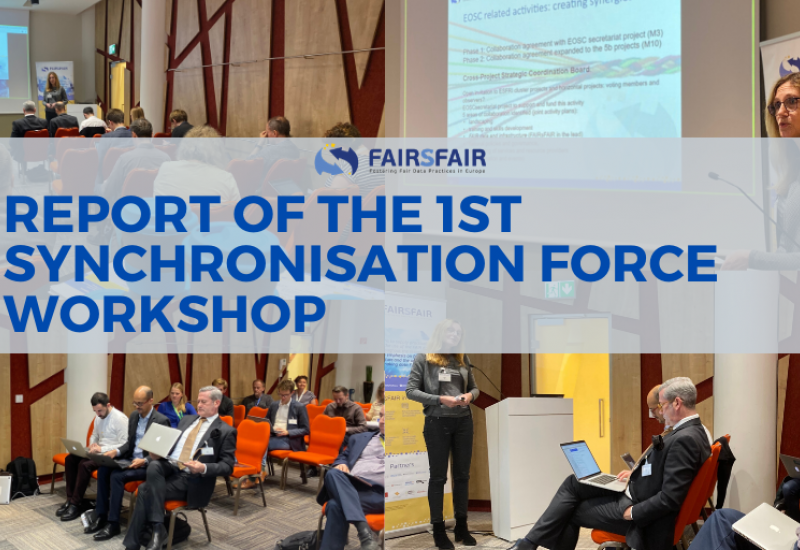Information Sharing and Policy Alignment Key to FAIRsFAIR Role in EOSC Development: Outcomes from the Synchronisation Force 1st Meeting

Increased information sharing, a common FAIR terminology, alignment of recommendations on FAIR policies, contribution to the definition of PID policies between FAIRsFAIR, the EOSC Working Groups and other projects are some of the outcomes documented in a report on their first workshop just published by the FAIRsFAIR Synchronisation Force.
Steps to ensure greater harmonisation of mutual efforts were discussed at length during the first of three planned workshops organised by the FAIRsFAIR Synchronisation Force, the body established to ensure that FAIRsFAIR project activities dovetail with the EOSC, feed into and complement the work being done by other projects in the research data and FAIR space, and avoid duplication of effort. The meeting was organised in conjunction with the EOSC Symposium on 25 November 2019, and focused primarily on identifying synergies with the activities of the five EOSC Working Groups on Rules of Participation (RoP), Landscape, Architecture, Sustainability, and FAIR.
The day’s programme was structured around sessions dedicated to each of the five EOSC Working Groups. This enabled both FAIRsFAIR and WG representatives to match project activities and outcomes with the relevant sources for input and feedback within the Working Groups. An attempt was also made to analyse project activities and outputs in terms of the recommendations from the European Commission Expert Group report Turning FAIR into Reality (TFiR) which lays out an Action Plan for FAIR implementation based on a broad ecosystem of shared concepts, technologies, services, skills and culture.
Key Recommendations
- Ensure better information sharing and awareness raising. Whilst requisitioning a desk analysis is beyond the scope of FAIRsFAIR, a practical approach to information sharing to ensure awareness but avoid overload is needed. The idea that projects across the EOSC ecosystem publish summary abstracts of reports with links to key outputs to be published periodically and circulated to the more than 30 EOSC related projects was proposed.
-
FAIRsFAIR contribution to RoP. The main contribution to RoP from FAIRsFAIR is expected to come from WP4 FAIR Certification. Meanwhile, members from WP3 (“FAIR policy and practice”) and WP7 (“FAIR data science and professionalisation”) should try to come up with recommendations on policies regarding acknowledgement and citation within the framework of data reuse.
- Given that most projects are undertaking landscaping activities of some kind and there is a real risk of duplication of effort as well as “survey burnout” on the part of respondents, it was agreed that efforts would be made to synchronise the various surveys during the design phase, and share the results and the associated analysis. The upcoming EOSC Landscape WG validation and FAIRsFAIR workshops present an opportunity to compare and align the emerging recommendations and work towards the collaborative planning of further studies.
-
Share the work related to Terminology for FAIR which has been developed as part of FAIRsFAIR activities on FAIR Semantics. The FAIRsFAIR WP2 team has already developed a large piece of work to align the terminology used by the project team and will contribute to the Architecture WG “Ontologies & Metadata” and “Glossary” sub-topics with a specific focus on the terminology for FAIR. FAIRsFAIR also continues to support and participate in the terms4FAIRskills project which aims to create a formalised terminology to describe the competencies, skills and knowledge associated with making and keeping data FAIR.
-
The Synchronisation Force should closely follow the work of the FAIR WG on PIDs and look for ways to contribute to the outcomes and integrate them into the wider PID-related work of FSF. FAIRsFAIR should closely follow the work of the FAIR WG on Persistent Identifiers (PIDs) and look for ways to contribute to the outcomes.
- Foster engagement with the ESFRI cluster projects. These projects are not currently engaged with FAIRsFAIR project activities. A plan is being developed to foster this engagement with specific support from the new members of the recently expanded European Group of FAIR Champions. Broader participation from ESFRI cluster projects will be pushed during the upcoming Synchronisation Force workshop in The Hague. Where necessary, dedicated engagement strategies can be developed following this 2nd workshop.
Turning FAIR into Reality
Given that clustering project activities and outputs around recommendations from the Turning FAIR into Reality (TFiR) report provided a useful mechanism for measuring progress and establishing commonalities between projects, this approach will be adopted during the second Synchronisation Force workshop scheduled for 29 April in Den Haag, The Netherlands, where the work of FAIRsFAIR, the EOSC5b and the Cluster projects will be assessed. Representatives will also be invited from the so-called horizonal projects such as FREYA and OpenAIRE which focus on transversal and foundational infrastructural issues.
► Read the full report here.

FAIRsFAIR primary stakeholders within the EOSC ecosystem
